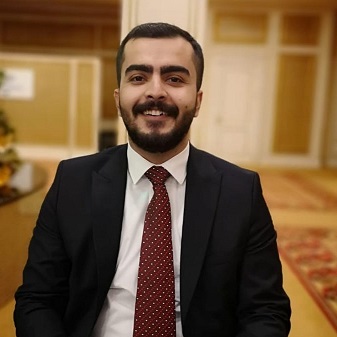Iraq, Opec’s second-largest producer, is in talks with the international oil majors operating in the country to help boost its crude production capacity to about 8 million barrels per day, the country’s oil minister said on Wednesday.
Ihsan Ismail also said Baghdad considered oil trading between $75-$80 per barrel range as a “fair price for both producers and consumers”.
Eighty-five per cent of Iraq’s revenue is dependent on hydrocarbons and it currently has a production capacity of 5 million bpd.
The country has three oil output scenarios: high, medium and low, and “we agreed in Iraq to go with the medium scenario, which speaks about 8 million bpd”, Mr Ismail told an online panel at the Energy Intelligence Forum.
Iraq is engaged in discussions with international oil companies including Shell, BP, Exxon Mobil, Lukoil and Italy’s Eni that operate in the country to help it boost its crude output, he said.
“There is a new discussion with all our partner IOCs to optimise the production to about 8 million bpd by end-2027,” the minister said.
“I think we have completed about 90 per cent to 95 per cent of these discussions.”
Our target is to reach more than 6 million bpd by the end of 2024
Ihsan Ismail, Iraq’s oil minister
Brent, the benchmark under which more than half of the world’s oil trades, has rallied in the past week.
On Wednesday, it gave up earlier gains to trade 0.75 per cent lower to $81.94 a barrel at 4.23pm UAE time. West Texas Intermediate, the gauge that tracks US crude, fell 0.87 per cent and was trading at $78.24.
Both benchmarks have gained about 60 per cent since the beginning of this year amid a strong economic rebound that has boosted demand for oil.
Iraq is also investing in new infrastructure to expand its export capacity, the minister said.
“Our target is to reach more than 6 million bpd by the end of 2024.”
The country, Mr Ismail said, was already in the process of bidding for a new offshore pipeline, which will help boost its export capacity from the current 4 million bpd.
In June, Iraq’s oil ministry spokesman Aseem Jihad said the country planned to export its crude to global markets in “America, Asia and Europe”.
Higher oil prices and larger export volumes support oil producing economies of the region and lower their fiscal breakeven prices, according to the International Monetary Fund.
The fiscal breakeven price is the base price needed to balance the budgets of oil-exporting countries.
The fiscal breakeven price of Iraq has increased steadily since 2018, when it was $45.40 a barrel. Last year, it was $63.70, which is expected to hit $71.30 in 2021, before falling to $66.10 next year, according to the fund.
Iraq, which on Monday announced approval of talks with US energy company Chevron to develop four exploration blocks in the southern part of the country, expects to sign a deal with the energy major within the next few weeks, the minister said on Wednesday.
Technical talks for the development of exploration blocks in the southern province of Dhi Qar have already finished and Iraq National Oil Company is now engaged in commercial and partnership talks with the US firm, he said.
READ MORE
Iraq signs $27bn worth of energy projects with France’s TotalEnergies
Rapid economic rebound underpins higher oil prices, TotalEnergies chief says
“Chevron is a very important partner for Iraq,” Mr Islamil said.
The planned project will be among the biggest in the country.
The state-controlled INOC will also be a 40 per cent partner with French oil major TotalEnergies, which signed a $27 billion deal with Baghdad for four oil and gas projects.
TotalEnergies will make an initial investment of $10bn in the country, with engineering investment in projects to start “immediately”, the company’s chairman and chief executive Patrick Pouyanne said last month.
The company will invest in projects to recover gas being flared across three oilfields in Iraq and use the gas to generate power from a plant with 1.5 gigawatts capacity in the first phase. The move will help the country plug its power deficit and use its energy reserves more efficiently.
The deal with TotalEnergies is part of Iraq’s energy transition as it has renewable and gas capturing components, Mr Ismail said.
“This project is very important for our energy sector.”
The minister said it would increase country’s “energy profile” and help it attain its goal of ultimately meeting all its power needs from locally produced gas, a vital step in energy transition.
Opec’s secretary general, Mohammad Barkindo, who spoke on the same panel, called on other energy producers to follow Iraq’s lead and continue to invest in their oil and gas sectors to avert a potential supply crunch in the long term.
Crude will remain the biggest component of the international energy mix until 2045.
The world’s population will rise and the global economy will more than double in size to $270 trillion, which will boost energy needs, Mr Barkindo said.
He, however, criticised economies campaigning to cut investments in oil and gas sector and said the conversation about energy transition and energy poverty had been “overtaken by hype”.
Sources: The National, 6. October, 2021
(*) Sarmad is the Company & Markets Editor of The National, with more than 25 years of experience working in Pakistan and the UAE. Over the years, Sarmad has reported on global and regional economic developments, equity markets, banking, energy, finance, property and technology sectors. He has interviewed key policymakers, central bank governors and global and regional executives including Mubadala’s Khaldoon Al Mubarak, Siemens’ Joe Kaeser, Emaar’s Mohamed Alabbar, DP World’s Sultan bin Sulayem, Franklin Templeton’s Mark Mobius and Tadawul’s Khalid Al Hussan among others.








Comment here